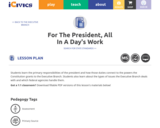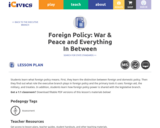
In this video segment adapted from NOVA, scientists investigate how farming along the Mississippi River impacts floods and what can be done about it.
- Subject:
- Science
- Material Type:
- Audio/Video
- Provider:
- PBS LearningMedia
- Date Added:
- 11/06/2023

In this video segment adapted from NOVA, scientists investigate how farming along the Mississippi River impacts floods and what can be done about it.

A book about a hot air balloon festival. Includes audio narration in 15 additional languages with text in English.

In this lesson plan, younger students wrap up a bird unit by making a bird mobile and then write facts on their display.

Feet are wonderful things. Look at all the things they can do! Includes audio narration in 22 additional languages with text in English.

Students learn the primary responsibilities of the president and how those duties connect to the powers the Constitution grants to the Executive Branch. Students also learn about the types of issues the Executive Branch deals with and which federal agencies handle them.
LESSON OBJECTIVES: Identify powers of the executive branch described in Article II of the U.S. Constitution *Describe the responsibilities of the president and vice president *Evaluate the difficulty of certain presidential responsibilities *Name the current president and vice president and their political party *Recall the length of a president's term and the number of terms to which a president may be elected *Understand presidential succession and identify the officeholders next in line to become president *Identify key departments in the executive branch

This superb site has detailed information about the composition of the atmosphere, how it is always changing, how it protects life on earth, and the destructive impact human activity has on it. There is an atmosphere design lab, as well as sections on atmospheric researchers and teacher resources.

This media-rich essay from NOVA Online describes the challenges of forecasting volcanic eruptions and includes information about specific cases.

Students learn what foreign policy means. First, they learn the distinction between foreign and domestic policy. Then they find out what role the executive branch plays in foreign policy and the primary tools it uses: foreign aid, the military, and treaties. In addition, students learn how foreign policy power is shared with the legislative branch.
LESSON OBJECTIVES: Define the terms "foreign" and "domestic" by identifying common-use phrases that use these words. *Distinguish between foreign and domestic policy by analyzing examples of both. *Take notes about the three main tools the executive branch uses for foreign policy. *Determine how the executive and legislative branches share foreign policy powers by matching powers with branches. *Categorize current and historical examples of foreign policy in action by analyzing the examples and matching them with the correct foreign policy tool.

This video segment from NOVA: "The Killer's Trail" investigates the potential for DNA evidence to solve murder cases, even those from the distant past.

Take a walk in the forest and enjoy the trees and animals that live there. Book includes audio narration in 7 additional languages with text in English.

The University of Chicago provides thousands of primary source documents concerning the diverse contents of the Constitution. Documents underlying the proposed Constitution, as well as documents of the time debating the proposed Constitution are available and sorted by the major themes of the Constitution. Links to each part of the text of the Constitution and the Bill of Rights are also available.

The University of Chicago provides a letter from Richard Henry Lee to George Mason in which Lee describes the financial problems the Confederation has run into and suggests minor reforms be made.

The original text of a statement by John Tyler, member of the Virginia Constitutional Ratifying Convention, on his opposition to the new Constitution.

This page is a series of writings by Joseph Story on the jurisdiction, both original and appellate, assigned to the Supreme Court by the Founding Fathers. Published in 1833.

Excerpts from John Locke's famous 1689 work "Two Treatises of Government" where he discusses his political ideas that came to influence the U.S. Revolutionaries.

Read the words of John Adams at the Constitutional Convention where he is debating the meaning of "the people" in the Constitution.

Read the actual text of William Penn's "Frame of Government" establishing the basis for self-governing in the colony of Pennsylvania. Outlines the responsibilities and civic duties of government officials and citizens.

Read Francis Harry Compton Crick's Nobel Lecture entitled "On the Genetic Code," which was originally given by Crick December 11, 1962.

Basic introduction to the formation of the negative in French. The site has good examples of different constructions (ne pas, jamais, rien etc.)

In this interview transcript from People's Century, northern civil rights activist and Freedom Rider Jim Zwerg describes his experiences.